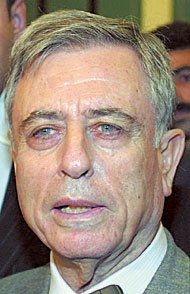Syrian Vice President Abdul Halim Khaddam was the only Syrian official who visited the American University Hospital in Beirut to inquire about the health of Minister, Deputy, and colleague Marwan Hamadeh after he survived an assassination attempt on the morning of October 1, 2004. He was received by the leader Walid Jumblatt at the entrance of the external hospital, calming the angry sentiments of people against the Syrian guardianship regime over Lebanon. They held Syrian and Lebanese intelligence responsible for the attempt to assassinate the peace dove Marwan Hamadeh.
Abu Jamal’s insistence on going to the hospital directly in broad daylight, walking tens of meters to check on Marwan, was a significant indication of his personal, human, and political denunciation of this crime. He could place his tearful eyes in the apologetic eyes of the weeping Walid Jumblatt, until it seemed that both were at a crossroads with no turning back. Jumblatt severed all bridges for dialogue that could arise after this crime with the Syrian security apparatus and its Lebanese counterpart, and with those who provide him with the reasons for strength and decisions in Damascus. Abdul Halim Khaddam, on the other hand, cut any doubt with certainty that the one who was determined to forcibly extend the term of President Emile Lahoud on September 2, 2004, luring the international decision 1559 calling for the withdrawal of Syrian forces and intelligence from Lebanon, was the same one who led the situation into tension and then an explosion. The attempt to assassinate Hamadeh was the bloody, harsh, and painful expression of it.
Abdul Halim Khaddam was the only Syrian official (and his two sons) who came to Lebanon hours after the assassination of Prime Minister Rafik Hariri on the afternoon of February 14, 2005. He entered Dar Qarantina, and memories of the intimate relationship with his late great friend raced between his eyes and ears. The angry chants of the crowd around the house to every corner against the Syrian security system ((Hey Wella Syria, get out)) resonated.
For a moment, Khaddam did not feel that these chants were directed at him, even if some of its phrases reached him. Everyone in the house, from his family to politicians and media men, knew that Khaddam was in Damascus against all these repercussions, starting from his rejection of the forced extension for Lahoud to his understanding that the policy that imposed the extension is the one that lured the international decision and its destructive results: the attempt to assassinate Marwan Hamadeh and the terrorist assassination of Rafik Hariri.
Yes,
Abu Jamal was openly against the forced extension of Emile Lahoud, and he informed Lebanese politicians close to Syria that if this decision passed, its consequences would be disastrous for Lebanon and Syria. The response to Abu Jamal within the authority in Damascus was that he takes this stance against Lahoud, driven by his relationship with Rafik Hariri and his bet on the success of his project. Perhaps the seclusion of Abdul Halim Khaddam in Damascus from any crucial decision of the authority there, especially towards Lebanon, where he was the most informed Syrian about its situation, is the least damage that Khaddam pays as a result of his relationship with Hariri. And how much worse fate awaited Khaddam if not for the significant failure that affected everyone dealing with Lebanon after him.
Now,
When Abdul Halim Khaddam stands within the framework of discussing the political situation in the political committee formed by the ruling Ba’ath Party in Damascus to prepare the political paper for the upcoming Qatari conference in the Syrian capital, and confronts the hero of the political phase that brought Syria into the fire of international war against it, Arab isolation, and its humiliating forced withdrawal from Lebanon, Farouk al-Shara, he does not appear to seek personal revenge against al-Shara, whom he not only dislikes but also as a response to his political and personal dignity that was stabbed due to his intelligence and good conduct. He found how the entire Syrian situation in Lebanon shifted from seizing the nation’s throat to a situation where the Syrian regime is forced to deny a simple visit by a security intelligence delegation to Lebanon to encourage groups that collaborated with it to vote for this or that.
Abdul Halim Khaddam refuted the lie that spoke of a conflict between the old guard and the new guard in Syria in his positions.
Abu Jamal revealed that those in the old guard were smarter, their behavior was wiser, and their conduct was better than all those accused of being in the new guard.
Khaddam, from the old guard, was against the extension for Emile Lahoud, against the aggression of Walid Jumblatt, and against this brutal behavior against Rafik Hariri from its roots.
The new guard was against all of this, absolutely.
Original article title: “Messages from the Editor-in-Chief to… Abu Jamal, the Old – New” by the Editor-in-Chief of Al-Shara: Hasan Sabra.

